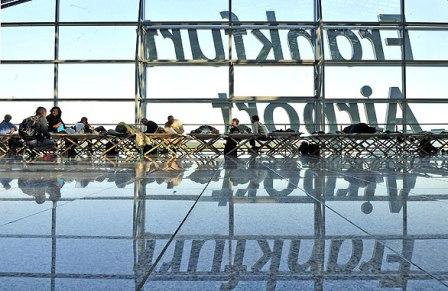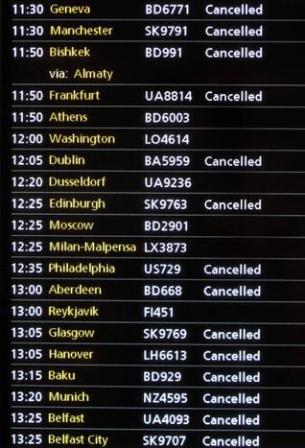Tempo de leitura: menos de 1 minuto
.
Volcanic ash [cinza] cloud [nuvem] grounds [suspende, cancela] 16,000 flights [voos] Saturday
STORY HIGHLIGHTS
- About 16,000 flights expected to be canceled in European airspace Saturday
- Airspace over United Kingdom and Belgium will be closed until Saturday night
- Ash from Icelandic [islandês] volcano threatens [ameaça] jets [aviões a jato], stalling [parar; apagar (inf.)] engines [turbinas] and causing electrical failure [pane]
- Volcano in Iceland still erupting, not clear when it will stop
London, England (CNN) — About 16,000 flights are expected to be [devem ser] canceled in European airspace Saturday because of the cloud of ash from the Icelandic volcano, European air traffic [tráfego] authorities said Saturday.
Eurocontrol said it expected about 6,000 flights to take off [decolem] Saturday, compared with the normal 22,000.
On Friday about 10,400 flights took place [foram realizados] in Europe, compared with the normal 29,000 — meaning [ou seja] more than 18,000 flights were canceled for the day [no mesmo dia; naquele dia].
Twenty-three European countries were prohibiting takeoffs [decolagens] and landings [pousos] Saturday, according to Eurocontrol and local authorities. Some of those countries kept their airspace open, but it may be difficult to access it because in most cases, the surrounding area [entorno] is not available for flights, Eurocontrol said.
 Airlines including Air France, Lufthansa, British Airways, Ryanair and Qantas announced [divulgaram] restrictions to their schedules [horários] in Europe because of the ash, which experts have said can stall engines and cause electrical failures on board aircraft.
Airlines including Air France, Lufthansa, British Airways, Ryanair and Qantas announced [divulgaram] restrictions to their schedules [horários] in Europe because of the ash, which experts have said can stall engines and cause electrical failures on board aircraft.
Forecasts [Previsões (meteorológicas)] suggest the cloud of ash will persist and that the impact will continue for at least [no mínimo] the next 24 hours, Eurocontrol said Saturday morning.
The measures [medidas] were choking [sufocando] international travel [tráfego aéreo internacional] and stranding [prejudicando] thousands of passengers across the globe [ao redor do mundo].
It was a chaotic scene Saturday morning at London’s Heathrow airport. At Terminal 3, which serves long-distance destinations like New York, South Africa and Washington, passengers complained [reclamavam] they were getting no proper communication from their airlines.
Flight staff [funcionários] were handing out [distribuindo] leaflets [folhetos], and some of the airlines were rebooking [remarcando] passengers on later [posteriores] flights.
It was busy [movimentado], too, at the ferry [balsa] port in Calais, France, where passengers were hoping to catch a ride across [atravessar] the English Channel [o Canal da Mancha].
“The walk-in terminal [terminal de pedestres] in Calais is manic [uma loucura],” said Alasdair Russell, who went to Calais from central England to pick up [ir buscar; apanhar] a friend’s father. “The car park [estacionamento (BrE)] outside is full of people trying to hitch lifts [pegar carona]. It’s fairly mental [insano].”
The line [fila] for tickets [passagens] didn’t appear [parecia] to be moving, Russell told CNN.
P&O Ferries, one of the largest cross-channel [travessia do canal] ferry operators, said it was receiving record calls and bookings [número recorde de ligações e reservas] and could not accept any more reservations on the Dover-Calais route [trajeto] until Wednesday.
The company normally gets [recebe] a few thousand calls a day, but by lunchtime [até a hora do almoço] Friday it had logged [havia recebido] more than 30,000, P&O said on its Twitter feed.
SeaFrance Ferries, another major operator, said it had “overwhelming [impressionante, avassaladora] demand” for reservations and was limiting the number of foot passengers [passageiros a pé] it could take on board [embarcar].
Russell, who is traveling by car, said his friend’s father arrived in Calais from Portugal, having paid 2,000 euros ($2,700) to a private chauffeur to get there. The ride [a viagem (de carro)] took [durou] 20 hours, Russell said.
Peter Brown, the founder [fundador] of Brown’s Chauffeur Hire in London, said he is seeing similar fares [preços (geralmente de passagens e diárias de hotel)] as passengers who can’t fly try other means [meios] to get to their destinations.
He told CNN passengers have booked trips [viagens] to Lisbon, Portugal; Cannes, France; Duesseldorf, Germany; Zurich, Switzerland; Brussels, Belgium; and Paris and Lyon in France. “The longest journey was two and a half days to Lisbon,” he said. “It required an overnight stay [pernoite] and the whole journey totaled 4,000 pounds [libras (esterlinas)] ($6,150).”
Businessman J.P. Brommel was attending a TV conference in Cannes, France, when the problems began and said he has been unable [não conseguiu] to return home to New York.
Many of the 11,500 attendees [participantes] at the conference who found themselves stranded [que não conseguiram passagens] have resorted [recorreram] to driving rental cars [carros alugados] long-distance to get home, but one problem is that it’s spring break [geralmente uma semana de férias em comemoração à chegada da primavera] for many countries in Europe.
 “Even if you can rent a car, if you can find one, you’re going to be dealing with [enfrentará] a tremendous amount of traffic on the highways [estradas] here, so it’s just a touch and go [pouco provável] situation,” Brommel told CNN.
“Even if you can rent a car, if you can find one, you’re going to be dealing with [enfrentará] a tremendous amount of traffic on the highways [estradas] here, so it’s just a touch and go [pouco provável] situation,” Brommel told CNN.
Others are trying to drive to nearby [próxima; vizinha] Toulon to catch the high-speed [alta-velocidade] TGV [abreviação em francês: train (à) grande vitesse (high-speed train)] to Paris, or driving to Madrid, Spain, where they hope [têm esperança] to catch flights home, Brommel said.
The ash cloud is drifting [está se deslocando] south and eastward [para o sul e para o leste] over Europe. Although barely visible [praticamente invisível] in the air, the ash — made up of [composta por] tiny [minúsculas] particles of rock, glass and sand — poses [representa] a serious [grave] threat to aircraft.
Past incidents of aircraft trying to fly through volcanic ash clouds and suffering damage [avarias, danos] and engine failure led [fizeram com que] European officials [autoridades] to shut [fechassem] their airspaces rather than [em vez de] risk a catastrophe, said Joe Sultana, an official at Eurocontrol, the intergovernmental body [órgão] that manages [administra] European air travel.
“I cannot say whether [se] it’s an overreaction or underreaction [a reação foi exagerada ou insuficiente],” Sultana said Friday. “I think everybody is working in the interest of safety. We understand the impact to the airlines … but safety comes first [é primordial].”
Travelers rush to trains and ferries
Airline analyst Jamie Bowden, standing outside Heathrow where planes were parked at the gates, told CNN he had never seen a situation like this.
“I’ve been in the business for more than 30 years and I’ve never known Heathrow Airport to be this quiet [calmo, vazio],” Bowden said. “This kind of disruption [transtorno] is unprecedented [sem precedentes]. I think this will be going on [continuar] for at least eight to 10 days before it starts settling back to normal [até que a situação comece a voltar ao normal; até que a “poeira comece a baixar”].”
The volcano was still erupting and spewing [lançando] ash Saturday, said Agust Gunnar Gylfason, a project manager at Iceland’s Department of Civil Protection and Emergency Management. “We cannot tell how long an eruption like this will go on,” Gylfason said.
The eruption began March 20 beneath [embaixo] the Eyjafjallajokull glacier [geleira] in southern Iceland, blowing a hole [perfurando] in the ice. It worsened [(O quadro) se agravou] this week, forcing local evacuations and eventually [consequentemente] affecting European airspace.
When the volcano last erupted in 1821, the eruption lasted on and off [com interrupções] for two years, Gylfason said.
Experts: No end to volcano ash in sight [à vista]
The closures [fechamentos (dos aeroportos)] in Europe were having an effect worldwide [no mundo todo]. There were delays [atrasos] and cancellations Saturday at all 10 of Russia’s international airports, including those in Moscow and St. Petersburg, the Russian Transport Ministry said.
The Russian national railway [ferroviária] company RZHD added extra cars [carros (vagões)] to trains running [percorrem o trecho] between Russia and Europe, the company said.
Spain’s national railway RENFE said the few trains that run north to France daily [diariamente] were not full [cheios, lotados] because a strike [greve] by French engineers [maquinistas] had caused delays.
Spanish airports were operating but experiencing delays in flights to northern Europe, the Spanish air traffic authority AENA said. As of [A partir das] 7:30 a.m. (1:30 a.m. ET) Saturday, AENA said 708 flights had been canceled between Spain and northern Europe out of a total of [de um total de] 2,300 — a figure [número] representing 30 percent of all scheduled flights.
Airport authorities have increased [ampliaram] cleaning and medical services [serviço de limpeza e atendimento médico] to accommodate stranded passengers, and have asked food vendors to stock up [aumentarem seus estoques] and stay open for longer [prolongar o horário de atendimento], AENA said.
CNN’s Melissa Gray, Bharati Naik and Cristina Lynch in London, England; Maxim Tkachenko in Moscow, Russia; and Al Goodman in Madrid, Spain, contributed to this report.

Textos Mastigados: Volcanic ash cloud grounds 16,000 flights Saturday é um bom candidato a top 10
Anizio,
Obrigado pelo interesse na promoção. Registre a sua escolha no post da promoção. Obrigado.
Abraços a todos
Bom dia, sempre olho a fórum e posso dizer que é nota 10, parabéns.
Referente ao texto acima fiquei com a seguinte dúvida, qual a diferença entre o uso do whether e do if ?
Marcelo,
Obrigado pelo interesse no Tecla SAP e pelo elogio. O Prof. Denilso de Lima escreveu um post muito interesse sobre o assunto: “Qual é a diferença entre ‘if’ e ‘whether’?“. Tenho certeza de que a dúvida será esclarecida.
Abraços a todos
Excelente texto Ulisses. Aliás, seu trabalho é excelente. Acabei de indicar o seu site para uns amigos meus. Parabéns.
Enio,
Muito obrigado pela ajuda na divulgação do Tecla SAP. Aliás, tomara que mais gente tenha a mesma ideia! 😉
Abraços a todos
Dear Ulisses.
Its really important to read the same texts as the Americans. The construction is different, the grammar is an adventure and the subjects updating teaches us new terms.
Thanks for the opportunity
Circe (no fear to make mistakes!)
Circe,
Concordo plenamente. Volte sempre!
Abraços a todos
Opa, boa, seria legal uma dica com essas palavras… li e fiquei confundido…
agora, “não se acanhe em colocar” foi muito bom…
abraços
Ricardo,
Também gostei do “não se acanhe em colocar”… 😉 Agora como já são “várias” pessoas fazendo o mesmo pedido, não vou ter como esquecer do assunto…
Abraços a todos
What’s up Ulisses?
Queria te pedir um favor: se fosse possível, que você fizesse um post sobre essas palavrinhas chatas que sempre me confundem:
“Tough, though, thought, through, thorough e throughout [e se existirem outras, não se acanhe em coloca-las. hsausahsuahasu]”
Obrigado dese já. 🙂
PS: eu nao sabia se existia um local específico para fazer pedidos ou whatever, então pedi aqui mesmo. Qualquer coisa, desculpe a minha falta de senso. hsauashuas
Brenner,
Obrigado pela sugestão. Aliás, acho que já escrevi uma dica sobre esse assunto. Vou procurar e, se não encontrar, prometo que vou escrever sobre essas semelhanças ortográficas.
Abraços a todos